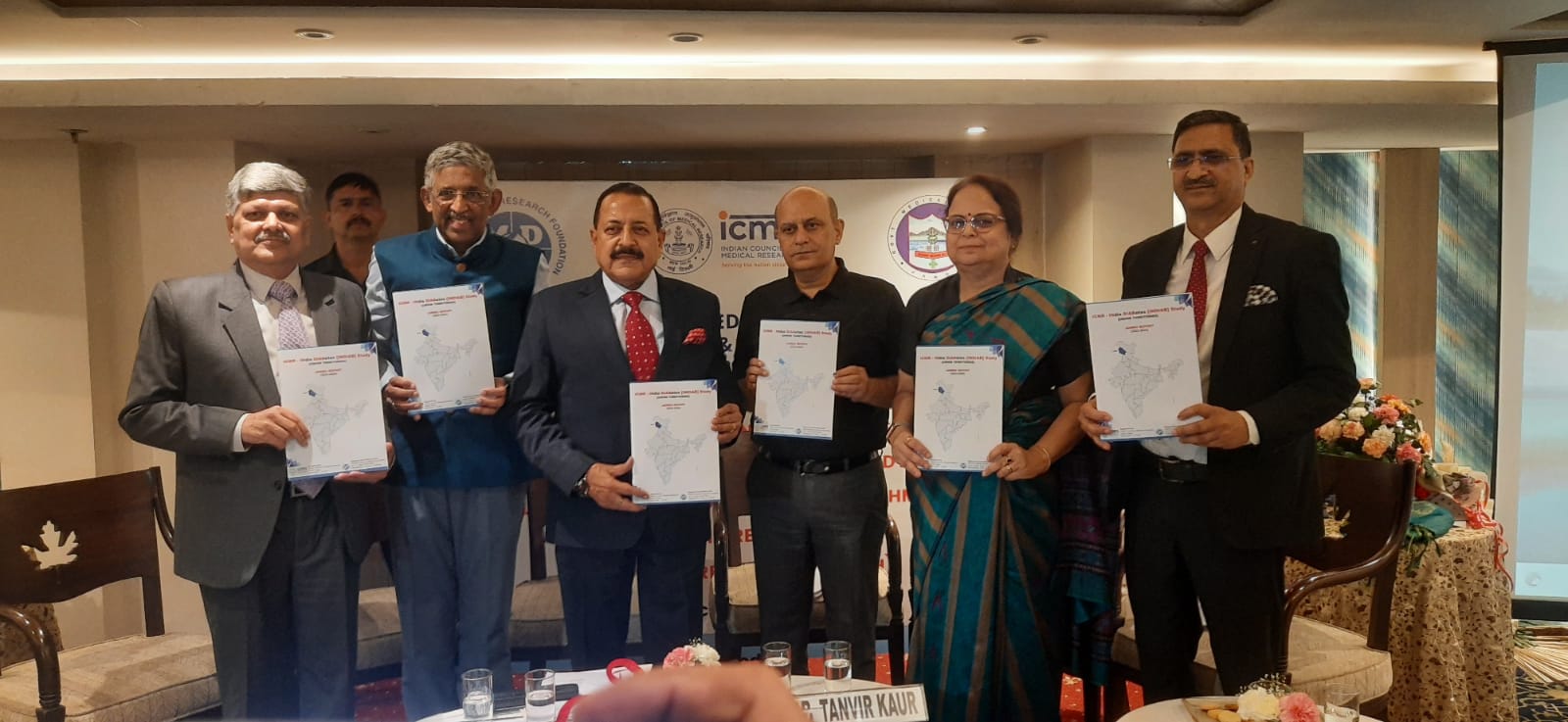
The prevalence of diabetes and other non-communicable diseases (NCDs) has been steadily rising across India, and the Union Territory of Jammu, Kashmir, and Ladakh is no exception. The latest findings from the ICMR-India Diabetes (ICMR-INDIAB) national study, conducted by the Indian Council of Medical Research (ICMR) in collaboration with the Madras Diabetes Research Foundation (MDRF), offer a comprehensive look into the alarming rates of diabetes, prediabetes, and other metabolic disorders in the region. This study, the first of its kind for Jammu, has unearthed critical data that underscores the urgent need for targeted public health interventions to curb the rising tide of these diseases.
The Alarming Statistics: Prevalence of Diabetes and Prediabetes
According to the findings from the ICMR-INDIAB study, the overall prevalence of diabetes in Jammu stands at 18.9%, with a striking variation between urban and rural areas. Urban areas report a significantly higher prevalence at 26.5%, while rural areas have a lower but still concerning rate of 14.5%. Alongside this, 10.8% of the population in Jammu is living with prediabetes, a condition that serves as a critical warning sign for potential future diabetes.

What’s particularly concerning is that 40% of individuals with diabetes in the region remain undiagnosed. This highlights a gap in awareness and access to healthcare, and reinforces the need for widespread screening and early intervention strategies to address this growing health crisis.

Rising Rates of Hypertension, Obesity, and Other Risk Factors
The study also sheds light on the high prevalence of other metabolic risk factors, which often accompany diabetes. Hypertension is found in 27.1% of the population, while generalized obesity and abdominal obesity are alarmingly prevalent at 41.7% and 62.7%, respectively. These factors are closely linked with the onset of diabetes and other NCDs, creating a vicious cycle of worsening health outcomes.

These findings align with global research indicating that diabetes is increasingly becoming a public health challenge not only in urban centers but also in rural populations, further stressing the need for comprehensive healthcare policies that focus on prevention, early detection, and management.

The Role of ICMR-INDIAB in Shaping Public Health Policies
The ICMR-INDIAB study stands as one of the largest epidemiological surveys on diabetes globally, encompassing 1,21,077 participants across India. This extensive research, which spans over 15 years, has provided critical insights into the national and regional burden of diabetes, prediabetes, hypertension, dyslipidemia, and obesity. With its door-to-door survey approach, the study has covered a diverse demographic, offering data that is crucial for formulating evidence-based public health interventions.
The study’s findings not only help estimate the current health burden but also offer guidance for future action. By providing data on the level of diabetes control among individuals, the study emphasizes the importance of shifting the focus toward prevention and management strategies tailored to the region’s specific needs.

Key Takeaways from the Study’s Findings in Jammu
The ICMR-INDIAB study has outlined several key health trends in Jammu:
- Urban Areas: The prevalence of diabetes is notably higher in urban settings (26.5%) compared to rural areas (14.5%). This highlights the impact of urbanization, lifestyle changes, and diet on the onset of diabetes and other metabolic diseases.
- Prediabetes: The overall prevalence of prediabetes stands at 10.8%, indicating a significant portion of the population is at high risk of developing diabetes in the future.
- Undiagnosed Cases: A worrying 40% of individuals with diabetes are undiagnosed, signaling a major gap in awareness and access to diagnostic healthcare.
- Metabolic Risk Factors: High rates of hypertension (27.1%), obesity (41.7%), and abdominal obesity (62.7%) further complicate the management of diabetes and other NCDs, emphasizing the need for integrated approaches to tackle these interconnected conditions.
Moving Forward: The Need for Urgent Action
The results of the ICMR-INDIAB study underscore the growing burden of NCDs in Jammu and the need for urgent intervention. Policymakers, healthcare providers, and community leaders must work together to design and implement effective strategies for the prevention, early detection, and management of diabetes and other NCDs in the region.
Key actions could include:
- Increased Screening and Early Diagnosis: Widespread screening programs should be established to identify individuals with undiagnosed diabetes and prediabetes, especially in rural areas.
- Public Awareness Campaigns: Raising awareness about the risk factors and complications of diabetes can help change lifestyle behaviors and encourage healthier eating and physical activity.
- Integrated Healthcare Models: Healthcare systems must be strengthened to provide comprehensive care for people with diabetes and related conditions. This includes training healthcare professionals, improving access to medications, and creating patient-centered care models.
- Community-Based Interventions: Engaging local communities in prevention programs, particularly in rural areas, can be key to addressing the root causes of diabetes and NCDs.
Also Read: Breast Cancer on the Rise This Awareness Month
The ICMR-INDIAB study has provided invaluable data that highlights the growing health crisis in Jammu and underscores the urgent need for a multifaceted response to tackle the rising burden of diabetes and other NCDs. With the data now available, stakeholders at every level of the healthcare ecosystem—from policymakers to healthcare professionals—have the opportunity to make informed decisions and implement interventions that can reverse these trends and safeguard the health of future generations.
As India faces a rising tide of diabetes and related NCDs, the findings of the ICMR-INDIAB study are a crucial step toward understanding and addressing this growing health challenge. For the healthcare industry, the insights gleaned from this study provide a roadmap for future action and a call to arms in the battle against diabetes and other NCDs.
Be a part of history! Express your interest and get featured in our exclusive souvenir, launching at the Bengaluru Tech Summit.
Be a part of Elets Collaborative Initiatives. Join Us for Upcoming Events and explore business opportunities. Like us on Facebook , connect with us on LinkedIn and follow us on Twitter , Instagram.
"Exciting news! Elets technomedia is now on WhatsApp Channels Subscribe today by clicking the link and stay updated with the latest insights!" Click here!
















